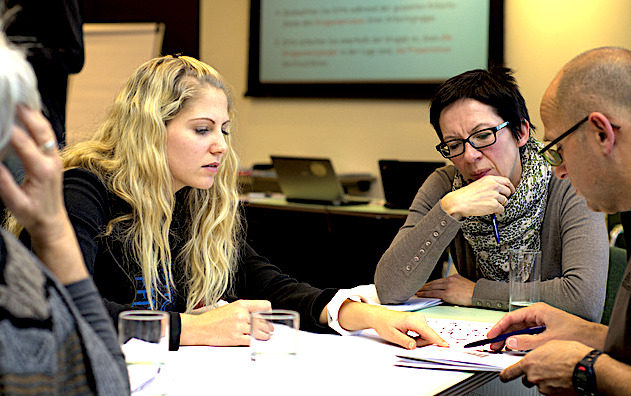Who shapes your expectations?

One of the rungs on the ladder of spiritual maturity is being wise about who shapes your expectations.
We singles all have ideas about how our life should be, but where do we get those ideas? What forces contribute to our notion of what we can look forward to in our future?
The path you take in life—your frustrations, your successes, what you're able to accomplish—all depends on who shapes your expectations. The good news is that each of us has the power to decide who we let guide us.
Let's look at the wisest ways to choose our own counselors.
Who shapes your expectations about life?
We singles are a complicated mix of our genes, our influences, and our experiences. Who shapes your expectations? Consider these:
- Parents, grandparents, relatives
- Teachers, coaches
- Friends
- Social media
- Television, movies
- Books, magazines
- Advertising
Each of these influences contributes to what you believe about life: how you think you should be treated, what you feel you can achieve, your attitude toward work, and your personal definition of success.
Some are positive, some are negative. Sadly, everyone doesn't have conscientious, loving parents. When you come from a dysfunctional family, it skews your belief system. If you were never encouraged and supported at home, you'll look for that affirmation somewhere else.
It's very hard to analyze your own expectations and correct them.
Too often we buy into unrealistic perspectives instilled in us by others. We may be convinced we can do anything we set our mind to—or we may believe we're worthless and capable of doing nothing.
Indeed, most people go through life constantly failing, because they aim too high, or accomplishing very little, because they aim too low.
Repeated failure and its opposite, lack of trying, take a toll on your self-esteem. Both patterns are hard to break.
Can we all be 'successful'?
These various influences are instrumental in your personal definition of success. For example, some families value money above everything else. Children are expected to become high earners. They soak up the message that you must be rich to succeed. The amount of money they accumulate becomes a yardstick for measuring their success.
In other families, character is emphasized as the measure of success. Honesty, kindness, generosity, and compassion are held out as the highest goals in life.
Some children are taught service is the greatest good. Parents model volunteering, helping, and caring as worthwhile qualities.

As we become adolescents, we may question our family's values. Children who do not conform to family patterns are often considered rebels or disobedient. They may not necessarily be bad; they simply take their own path. They become "black sheep."
All the while, other influences besides our family are working on us. We may embrace them or reject them, depending on our independence or because we simply don't like them.
Some people receive a lot of support and encouragement throughout their life. Others are self-motivated to achieve.
No matter what field we enter, the ability to persevere through failure is crucial. From sports to entertainment to business, the people who rise the highest refuse to give up. They keep trying no matter what. The same is true in our personal life.
Does life owe you anything?
Somewhere along the way, we each pick up the belief that life owes us something: happiness, success, fulfillment, good health, wealth, impressive possessions.
If you watch TV ministers who preach the Prosperity Gospel, you might believe God owes you those things. One popular speaker, who constantly talks about getting God's "favor," makes it sound as if Christianity entitles you to the best of everything, all the time.

That's not what the apostle Paul taught. Never was there a more faithful follower of Jesus who, at the same time, ran into one catastrophe after another. But Paul had realistic expectations.
Some of us singles believe life owes us a spouse. Or if we're Christians, we may think God owes us one.
People who possess many good things usually work very hard for them. Some inherit wealth or good health. A seemingly lucky few have them dropped into their lap. The difference between a child and an adult is a child thinks all their dreams will be realized easily. An adult learns it takes effort.
The credit card industry has convinced us we can own almost any material possession we want. People who fall for that lie end up deeply in debt and miserable. Debt is a crushing burden for people who had unrealistic expectations, and they number in the millions.
We rarely stop and ask ourself, "Are my expectations realistic? Do they line up with the way the world is?"
How to develop wise expectations
Who shapes your expectations? If you let the wrong influences do it, you're headed for unhappiness.
We singles must be discriminating in what we hope for in life and how we will achieve it. We must reject the voices that would exploit us, and they are many. We have to learn, sometimes the hard way, that we cannot buy happiness.
If we want wise expectations, there's only one place to find them: the Bible.
Now that may sound dull and limiting to you, but consider this. If it's God who shapes your expectations, he will also help you achieve them.

What does God want for you? First, your salvation. Second, he wants to mold you into the character of his Son, Jesus Christ. Believe it or not, that's the greatest adventure life can offer.
Your character is the only thing you take with you into heaven. Money, material possessions, awards and fame will all be left behind.
It's a colossal challenge to become like Jesus. We can do it only by surrendering to God, then obeying him. If you expect to become like Jesus, God will make that happen. You have to deny yourself and many of your worldly desires, but the transformation is well worth it.
The Bible is your guidebook to teach you what Jesus is like and what you must do to become like him. This is the noblest quest, life's ultimate achievement.
Yes, we are sinners and will be until we draw our last breath. We cannot be perfect, but we can take the path of sanctification, the ongoing process of conforming our desires to Christ every day.
Who shapes your expectations? When you let God do it, you'll become the person he wants you to be. There's no greater goal in life than that.
Related: Which Bible should you read?

Search amazon.com for "Bible" and you'll get so many results your head will explode.
Well, not really, but it can be confusing. If you want to make regular Bible reading a habit—and I strongly encourage that—you need a Bible you can understand and look forward to reading. The wrong Bible can just lead to frustration.
A Study Bible is an absolute necessity. They contain footnotes that explain the text, articles, sections on theology, maps, and possibly a concordance—which lets you look up words and find verses.
Unless your church requires it, I advise against the King James Version. Yes, the language can be beautiful, but it's also harder to understand. It was written in 1611, when people used "thees" and "thous." Bible scholars don't think it's the most accurate translation either, although many argue with that.
The English Standard Version (ESV) Study Bible is what I use. The language is clear and modern, and the translation is accurate. The study helps are excellent.
Check out this article on choosing a Bible.










